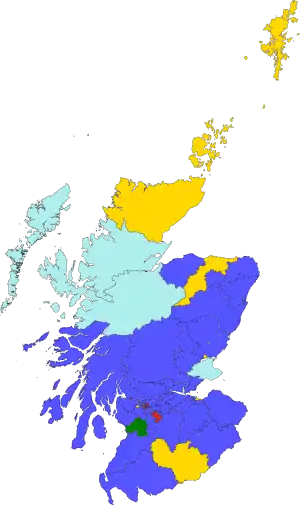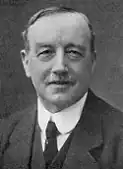| ||||||||||||||||||||||||||||||||||||||||||||||||||||||||||||||||||||
All 74 Scottish seats to the House of Commons | ||||||||||||||||||||||||||||||||||||||||||||||||||||||||||||||||||||
|---|---|---|---|---|---|---|---|---|---|---|---|---|---|---|---|---|---|---|---|---|---|---|---|---|---|---|---|---|---|---|---|---|---|---|---|---|---|---|---|---|---|---|---|---|---|---|---|---|---|---|---|---|---|---|---|---|---|---|---|---|---|---|---|---|---|---|---|---|
| ||||||||||||||||||||||||||||||||||||||||||||||||||||||||||||||||||||
 Results of the 1931 election in Scotland | ||||||||||||||||||||||||||||||||||||||||||||||||||||||||||||||||||||
A general election was held in the United Kingdom on Tuesday, 27 October 1931. Of the 74 seats representing Scotland, 71 seats represented burgh and county constituencies contested under the First-Past-The-Post electoral system, and 3 represented the Combined Scottish Universities multi-member University constituency.
The election saw massive gains for the Unionists across the country, with the party winning nearly 70% of all Scottish seats. The parties forming the National Government together won 64% of the vote, and 86% of the seats. In contrast the Labour Party, which had been the largest party in Scotland following the 1929 general election (where it had won 42% of the Scottish vote), was relegated into fourth place within just two years.
Following the election, with Labour appearing to teeter on the edge of the electoral abyss in Scotland, the Independent Labour Party increasingly moved apart from Labour, ultimately dissociating from the party in March 1932. The ILP had dominated the Labour movement in Scotland since 1918, dominating community based activism, and essentially forming the Labour Party in Scotland. This had ultimately served to undermine the organisational growth of the Labour Party in Scotland.[1]
Results
Burgh & County constituencies
| Party | Seats | Seats change | Votes | % | % Change | ||
|---|---|---|---|---|---|---|---|
| National Government (Total) | 64 | 1,385,385 | 64.0 | ||||
| Unionist | 48 | 1,056,768 | 49.5 | ||||
| National Liberal & Conservative | 8 | New | 101,430 | 4.9 | New | ||
| Liberal | 7 | 205,384 | 8.6 | ||||
| National Labour | 1 | New | 21,803 | 1.0 | New | ||
| Labour Party | 7 | 696,248 | 32.6 | ||||
| Communist | 0 | 35,618 | 1.4 | ||||
| National Party of Scotland | 0 | 20,954 | 1.0 | ||||
| New Party | 0 | New | 3,895 | 0.2 | New | ||
| Other | 0 | 32,229 | 0.8 | ||||
| Total | 71 | 2,174,329 | 100 | ||||
University constituencies
| Party | Candidate | Votes | % | ±% | |
|---|---|---|---|---|---|
| Unionist | John Buchan | unopposed | |||
| Liberal | Dugald McCoig Cowan | unopposed | |||
| Unionist | Archibald Noel Skelton | unopposed | |||
Votes summary
References
- ↑ William Kenefick (2007). Red Scotland!: The Rise and Fall of the Radical Left, C. 1872–1932. Edinburgh University Press. pp. 202–203. ISBN 978-0-7486-2517-8.



